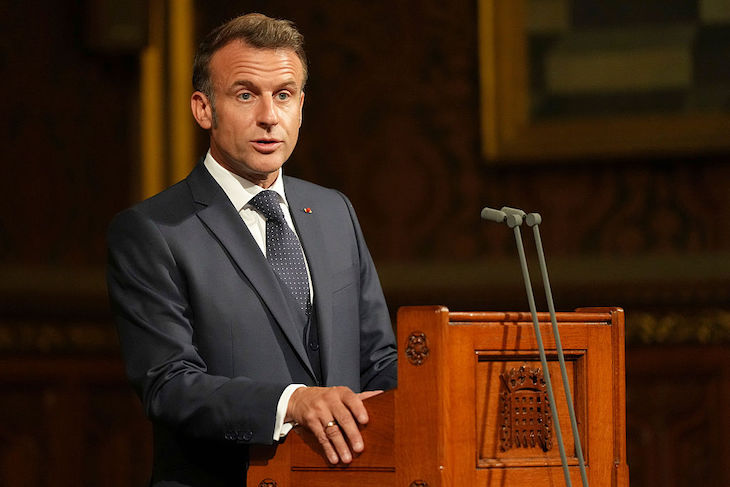When Japan’s Crown Prince Naruhito visited Windsor Castle in the early years of the 21st century, the Queen Mother gave orders that, over where he would give his speech, should be positioned the sword with which the Japanese forces had formally surrendered to Lord Mountbatten in 1945. Only an intervention from her daughter prevented this plot from becoming a reality.
If I were the King I’d be counting the spoons this evening
This afternoon, President Macron gave his speech underneath a statue of an old Queen. The verb in French cuisine for such unnecessary but beautiful touches like this is ‘historier’. True, Elizabeth I was more francophone than most of her dynasty – or successors – until perhaps the current monarch, but putting him underneath her was inspired.
It was a monarch, the present King who proved the government’s secret weapon. As he had been with President Trump, so he would be with President Macron. Over the course of Sir Keir’s attempt to launch a charm offensive to our long standing love/hate objects across the Channel, the King took the leading role. General de Gaulle might have succeeded in being a head of state without a state, but whether Sir Keir can manage a charm offensive whilst being devoid of charm is quite another matter.
Mr Macron arrived late to Parliament, presumably because Buck House was more his cup of tea. He referenced his affection for the King multiple times in the speech, including when he said ‘We love monarchy especially when it is not at home.’ Je pense the lady doth protest too much. I saw the covetous eye which Mr Macron cast at the ermine and thrones. If I were the King I’d be counting the spoons this evening.
The actual content of the speech itself was remarkable; precisely because it sounded like we’d heard it all before. In terms of content, Macron hit every big centrist button. Imagine Sir Keir Starmer with a comedy accent. A sort of Officer Crabtree in Allo Allo but more hapless. The general theme was about collaboration – this time not the Allo Allo type but on mutual areas of policy interest. The migrant crisis got about a minute and a half of vague promises of cooperation and a need to cut things off at source. Internet censorship, which brings out M. Macron’s Napoleonic dictatorial tendencies, got a long and rhetorically polished section. He even mentioned Sir Keir’s own personal cinematic Gospel: the drama Adolescence.
The problem was, while it was Starmerite – or should that be Starmeriste – in its topics, it was a reminder of how much better the French President is at selling centrist preoccupations than our own PM. He didn’t apologise for history but set his global aims in the context of French and British imperial history; he made an argument couched, not in the jargon of human rights law, but in the language of civilisational struggle. He didn’t make any lame football jokes either.
Yet perhaps as befits comparison to our own Prime Minister, it was a remarkably substance-free speech: lots of stuff about how wonderful working together was in theory, but little about what it looked like in practice. Most substantive was an explicit call for a two-state solution in the Middle East, but that’s been Anglo-French policy since the 1990s. Also, for all Macron’s talk about robust and independent foreign policy, the power or willingness to do something on the ground is minimal. Like most cross-Channel initiatives, this was still two bald men extolling the virtues of combs. It’s just that one of them has the decency to wear a wig. Or rather, un toupée.
There were still some lapins to be pulled from chapeaux. M. Macron announced that next year would be the year that the plan to swap the Bayeux Tapestry for the Sutton Hoo treasures on a mutual loan would finally come to fruition. In some ways it was the perfect metaphor for Anglo-French relations, even Macron made the joke that the idea had first been discussed during Theresa May’s premiership: Brexit was sorted quicker than this. Now, a stony-hearted cynic might say that the exchange is even more symbolic of the two countries’ recent relations: we give gold, they send us paperwork.
Yet for all the glitter of the state visit, the great elephant in the room, the one issue that will end up shaping the future of cross-Channel politics soon, whether our centrist leaders like it or not, remained unaddressed. And on a sunny day in the Channel, more and more dinghies came.








Comments